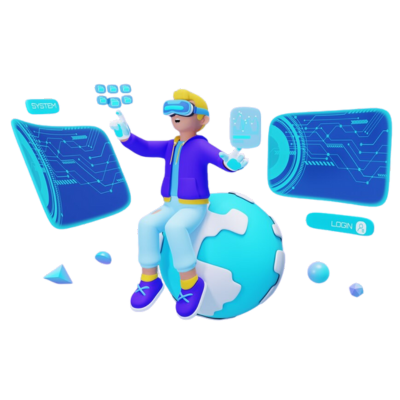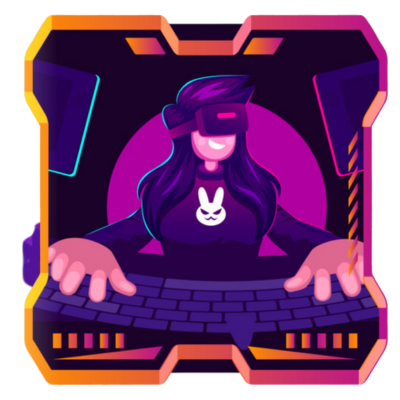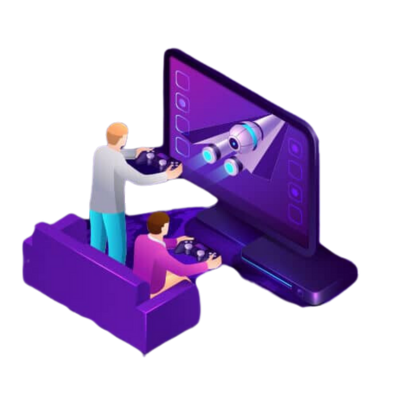Introduction
The gaming industry has been one of the most dynamic and rapidly evolving sectors in the entertainment world. Over the past few decades, it has grown from simple, pixelated games to highly immersive and complex virtual environments that attract millions of players globally. However, the emergence of Web3 games, powered by blockchain technology, decentralised platforms, and non-fungible tokens (NFTs), is poised to revolutionise the industry once again. Web3 games are not just another trend; they represent a fundamental shift in how games are developed, played, and monetized. In this blog, we will explore the impact of Web3 games on the traditional gaming industry, delving into the technical aspects, the role of Web3 gaming companies, and the challenges and opportunities this new paradigm presents.
Web3 Game Development Company
Work with a leading Web3 game development company to create the future of gaming.

Understanding Web3 Games
What Are Web3 Games?
Web3 games are decentralized games built on blockchain technology that offer players true ownership of in-game assets, which are often represented as NFTs. Unlike traditional games, where the game developer or publisher retains control over all aspects of the game, Web3 games empower players by giving them control over their digital assets, governance, and in some cases, the game’s economy. This decentralization is a key differentiator that has profound implications for the gaming industry.
The Core Principles of Web3 Gaming
Web3 gaming is built on several core principles:
- Decentralization: No single entity controls the game. Instead, it operates on a decentralized network where players have more autonomy.
- True Ownership: Players truly own their in-game assets, which are stored on the blockchain and can be traded, sold, or transferred outside the game environment.
- Transparency: All transactions and activities within the game are recorded on the blockchain, providing a transparent and immutable ledger that players can trust.
- Interoperability: Web3 games often support the use of assets and identities across multiple games and platforms, enabling a more connected and flexible gaming experience.
How Web3 Games Are Impacting the Traditional Gaming Industry
Disrupting the Business Models of Traditional Games
One of the most significant impacts of Web3 games on the traditional gaming industry is the disruption of established business models. Traditional games often rely on centralized monetization strategies such as in-app purchases, subscriptions, and advertising. In these models, players spend money on in-game items, but they do not truly own them. The value created by players is largely captured by the game developers and publishers.
Web3 games, however, introduce new business models that redistribute value more equitably among players. Through mechanisms such as play-to-earn (P2E), players can earn cryptocurrency or NFTs by participating in the game. These rewards can be traded or sold on secondary markets, allowing players to monetize their gaming experiences. This shift in the distribution of value challenges the traditional revenue models and has the potential to reduce the dominance of large publishers in the gaming ecosystem.
Web3 game platforms are at the forefront of this disruption, offering decentralized environments where players and developers alike can benefit from more equitable economic structures. Web3 gaming companies are leading the charge, creating platforms that empower both players and smaller developers to thrive without the need for intermediaries.
Redefining Digital Ownership and Player Rights
In traditional games, players do not have true ownership of their in-game assets. These assets are typically stored on centralized servers controlled by the game developer, meaning that players can lose access to their items if the game is shut down or if the developer changes the rules. This lack of ownership has long been a point of contention among gamers.
Web3 games address this issue by giving players true ownership of their in-game assets through the use of NFTs. These assets are stored on the blockchain, meaning that players have full control over them and can transfer, trade, or sell them as they see fit. This redefinition of digital ownership is one of the most profound impacts of Web3 games on the traditional gaming industry.
Moreover, Web3 games empower players with governance rights through decentralized autonomous organizations (DAOs). In a DAO, players can vote on key decisions related to the game’s development and governance, giving them a direct say in how the game evolves. This level of player empowerment is unprecedented in the traditional gaming industry, where players have little to no influence over the games they play.
Creating New Revenue Streams and Economic Opportunities
Web3 games are also creating new revenue streams and economic opportunities for both players and developers. In traditional games, revenue is typically generated through one-time purchases, in-game transactions, and subscriptions. While these models have been highly successful, they often limit the ways in which players can generate value from their gaming activities.
The play-to-earn model in Web3 games changes this dynamic by allowing players to earn rewards in the form of cryptocurrency or NFTs through gameplay. These rewards can then be traded or sold on decentralised marketplaces, providing players with a new way to generate income. This model has been particularly impactful in regions with limited economic opportunities, where players can earn a living through Web3 gaming.
For developers, Web3 games open up new revenue streams through the sale of NFTs, transaction fees on secondary markets, and the creation of decentralised applications (dApps) that integrate with the game. Web3 game development companies in the USA and India are at the forefront of exploring these new opportunities, building games that leverage blockchain technology to create sustainable and profitable ecosystems.
Enhancing Security and Transparency
Security and transparency are critical issues in the traditional gaming industry. Centralized servers and databases are vulnerable to hacks, data breaches, and manipulation, which can compromise the integrity of the game and the security of player data. Additionally, the lack of transparency in how games are managed and monetized can lead to distrust among players.
Web3 games address these challenges by leveraging blockchain technology to enhance security and transparency. All transactions and game activities are recorded on a public blockchain, creating an immutable and tamper-proof record that players can trust. This transparency extends to the game’s economy, governance, and development, ensuring that players have full visibility into how the game operates.
Furthermore, the decentralized nature of Web3 games reduces the risk of centralized points of failure, making it more difficult for hackers to compromise the game’s infrastructure. Web3 game development companies are focused on building secure and transparent platforms that protect player data and ensure the integrity of the game.
Fostering Innovation in Game Design and Development
The rise of Web3 games is also fostering innovation in game design and development. Traditional game development is often constrained by the limitations of centralized platforms, which can stifle creativity and limit the potential for new ideas. Web3 games, however, provide developers with new tools and opportunities to experiment with decentralized technologies, creating more dynamic and interactive gaming experiences.
For example, Web3 game developers can create complex in-game economies that operate independently of the developer, allowing players to trade and manage assets in real-time. They can also leverage smart contracts to automate gameplay mechanics, creating more responsive and adaptive game environments. These innovations are pushing the boundaries of what’s possible in game design and opening up new avenues for creative expression.
Web3 game development companies in the USA and India are leading the way in this innovation, creating games that challenge traditional design paradigms and explore the potential of decentralized technologies. By embracing these new tools, developers are able to create more engaging and immersive gaming experiences that resonate with players.
Expanding the Global Gaming Ecosystem
Web3 games are also expanding the global gaming ecosystem by making it more inclusive and accessible to a wider range of players and developers. Traditional gaming has often been dominated by a few large companies, with smaller developers struggling to gain traction in a highly competitive market. Additionally, players in developing regions have often been excluded from the economic opportunities provided by the gaming industry.
Web3 games are helping to level the playing field by providing decentralised platforms where smaller developers can launch and monetize their games without the need for intermediaries. These platforms also make it easier for players in developing regions to participate in the global gaming economy, providing them with new opportunities to earn income and build communities.
Web3 gaming companies are playing a crucial role in this expansion, creating platforms that support a diverse range of games and players. By lowering the barriers to entry, these companies are helping to create a more vibrant and inclusive gaming ecosystem that benefits everyone.
Web3 Game Development Services
Work with a leading Web3 game development company to create the future of gaming.

The Future of the Gaming Industry in the Age of Web3
As Web3 games continue to gain traction, the gaming industry is likely to see a convergence of traditional and Web3 gaming elements. Traditional gaming companies may begin to incorporate Web3 technologies into their existing games, creating hybrid models that combine the best of both worlds. This could involve integrating NFTs into traditional games, offering players true ownership of their assets, or creating decentralised platforms where players can trade and manage their in-game items.
This convergence has the potential to create new opportunities for both players and developers, as well as to expand the reach of Web3 games to a broader audience. By embracing the possibilities of Web3 while maintaining the strengths of traditional gaming, the industry can continue to innovate and grow in exciting new directions.
The Rise of Cross-Platform and Cross-Game Ecosystems
One of the most exciting possibilities of Web3 gaming is the potential for cross-platform and cross-game ecosystems. In a Web3 world, players could use their assets and identities across multiple games and platforms, creating a more connected and flexible gaming experience. This interoperability could enable players to move seamlessly between games, bringing their assets and achievements with them.
Web3 gaming companies are already exploring the potential of these ecosystems, creating platforms that support interoperability and cross-platform play. As these ecosystems continue to develop, they could transform the way players interact with games, creating a more integrated and cohesive gaming experience.
Expanding the Role of Decentralized Governance
Decentralised governance is likely to play an increasingly important role in the future of the gaming industry. As players become more involved in the development and management of games through DAOs, traditional gaming companies may need to adapt to this new reality by offering more opportunities for player participation and decision-making.
By embracing decentralised governance models, traditional gaming companies can create more engaged and loyal communities, as well as foster a greater sense of ownership and investment among players. This shift toward decentralized governance could also lead to more innovative and player-driven game development, as players take a more active role in shaping the games they play.
The Evolution of Game Design and Development
The rise of Web3 games is likely to lead to significant changes in game design and development. As developers gain access to new tools and technologies, they will be able to create more dynamic, responsive, and immersive gaming experiences. This could involve the use of smart contracts to automate gameplay mechanics, the creation of decentralised economies, and the integration of emerging technologies such as artificial intelligence (AI), virtual reality (VR), and augmented reality (AR).
Traditional gaming companies that embrace these new possibilities will be well-positioned to create innovative and engaging games that resonate with players. By staying ahead of the curve and experimenting with new ideas, these companies can continue to thrive in a rapidly evolving industry.
Level Up Your Web 3 Game! Get Expert Development Services Now!
Work with a leading Web3 game development company to create the future of gaming.

Conclusion
Web3 games are making a big splash in the traditional gaming industry by challenging old business models, redefining digital ownership, and opening up new opportunities for players and developers. Companies in the USA and India are leading this shift, pushing the limits of what’s possible in gaming.
However, this shift brings challenges, such as regulatory uncertainty, environmental concerns, and the need to balance innovation with traditional values. Traditional gaming companies will need to adapt to these changes while keeping what makes their games successful. Looking ahead, the mix of Web3 and traditional gaming, along with new trends like cross-platform play and decentralized governance, will shape the future of the industry, offering players even richer and more engaging experiences.















